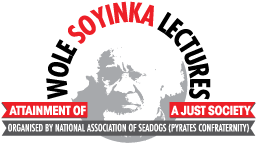10th Wole Soyinka Lecture: Humanitarian Effort on a Global Scale with Regards to Darfur. by Professors Pablo Idahosa, Sean Hawkins and Modupe Olaogun
- Tag: 2006 - 2009
- Tag: 2006 - 2009
The 10th Wole Soyinka Lecture:
- Theme: Humanitarian Effort on a Global Scale with Regards to Darfur
- Lecturers: Professors James Femi Kolapo, Pablo Idahosa, Modupe Olaogun & Sean Hawkins.
- NAS Capn: Prof. Olatunji Makanju
- Date: Saturday, 14 July 2007.
- City: Toronto, Ontario, Canada
- Venue: The Council Chambers, North York Civic Centre.
The About Lecturers:
A
ssociate Professor of African History at the University of Guelph, Ontario. Canada. Taught at the History Dept of Ahmadu Bello University, Zaria, Nigeria between 1985-1993.
Research Interests:
- War and society in precolonial sub-Sahara Africa
- Christian Missionary and West African communities before colonization
- Slavery, the Slave trades and post-abolition in Africa
Selected Publications:
- (2002). “The Political Impact of European Rule,” in Falola, T., ed., Africa Vol. 3: Colonial Africa, 1885-1939. Durham: Carolina Academic Press: 87-105.
- (2002). “Central Africa,” in Falola, T., ed., Africa Vol. 3: Colonial Africa, 1885-1939. Durham: Carolina Academic Press: 87-105.
- (2001). “The Ife Origin and Creation Myths.” Groniek Historisch Tijdschrift 151: 121-136.
- (2000). “CMS Missionaries of African Origin and Extra- religious Encounters at the Niger-Benue Confluence, 1858-1880.: African Studies Review 43 no 2: 87-115.
- (2000). “The 1858-59 Gbebe Journal of CMS Missionary James Thomas.” History in Africa 27: 159-192.
P
rofessor in the Division of Social Science at York University, where he also directs the African Studies Program, and teaches development Studies. He has written on development ethics, African political thought, the politics of ethnicity, and globalization and development. He is Author of the Populist Dimension of African Political Thought, co-editor of The Somali Diaspora and co-editor, with Peter Vandergeest and Pablo Bose, of the forthcoming Development’s Displacements. He is currently researching the relationship between ethnicity and displacement in Nigeria, and co-writing a work on the relationship between development and modernity in Africa. Among his ongoing research interests is the relationships between development and Cultural production in Africa, and the politics of AIDS in Africa. He is currently on the executive of the International Development Ethics Association, and among his future research projects is the History of Social Welfare in Africa.
A
ssociate Professor of English and a recently appointed Master of Stong College (July 2006). She teaches African and postcolonial literatures. She has published articles and presented papers on various African authors at conferences, and is interested in drawing attention to the different dimensions and genres of African literature. Her current research focuses on African literary and dramatic representations of the continent’s relationship with the Black Diaspora. She provides a venue for public awareness of African theatrical traditions as the artistic director of the AfriCan Theatre Ensemble (Toronto), which she founded in 1997.
A
ssociate Professor; Field: Modern social history, cultural history of sub-Saharan Africa, especially West Africa Professor Hawkins’ interests focus on social and cultural history of sub-Saharan Africa in the nineteenth and twentieth centuries. His former work focused on such topics as identity, political authority, religion, medicine, colonial law, and marriage; these were brought together in his recent book Writing and Colonialsim in North Ghana: The Encounter between the LoDagaa and “the World on Paper”, 1982-1992 (Toronto: University of Toronto Press, 2002). His present research project examines the history of Western perceptions, which often were little more than denials, of African emotional subjectivity. The project pays particular attention to the Anglo-American world of the last three centuries, looking at the history of Western discourses about slavery, race, kinship, and, finally, animals. He is also interested in the history of African identity, both on the continent and within the wider diaspora. This interest led to a collection of essays co-edited with Philip D. Morgan, The Black Experience of the Empire, (New York: Oxford University Press, 2004), which is a companion volume to the Oxford History of the British Empire. Finally, he is working on a set of pedagogical and publishing projects highlighting the African contribution to the Western idea and practice of freedom.
A
ll the speeches given by Professors James Femi Kolapo, Pablo Idahosa, Modupe Olaogun and Sean Hawkins on the occasion of the 10th Wole Soyinka Lecture Series in Toronto, Canada express the same cardinal objectives and commitments, which border on CHANGE concerning the respective humanity taken as the preferred point of reference by each lecturer – national, continental or global humanity – in this case with focus on global humanitarian effort regarding Darfur. They explicitly articulate the pyratical vision for the global society as well as the private ideals of the lecturers – who could as well be described as associates of our confraternity.
The themes and subject matters are iconic indexes of the rhetorics of revolutionary change and principally constitute the pyratical ideology of Wole Soyinka, on whose birthday occasions they were delivered. The only thing to add, at this point, as the reader goes through the pages of this book is to reiterate the need for him or her to join the like minds, whose opinions have been expressed herein, in re-shaping humanity – our common heritage. Our global humanity traverses the boundaries of race, colour, language, continent, and development. To change the globe into a space of freedom for all, thereby fashioning a new humanity is the ultimate quest of the Pyrate.
The globe is the constituency of Seadogs in their pursuit of this supreme quest. The quest here, we do hope, would be enough for minds that stereotypically misunderstand the confraternity as a cult of negative secrecy. At least, they now have another chance of knowing what Pyratism is: a social philosophy and strategy of social action.



